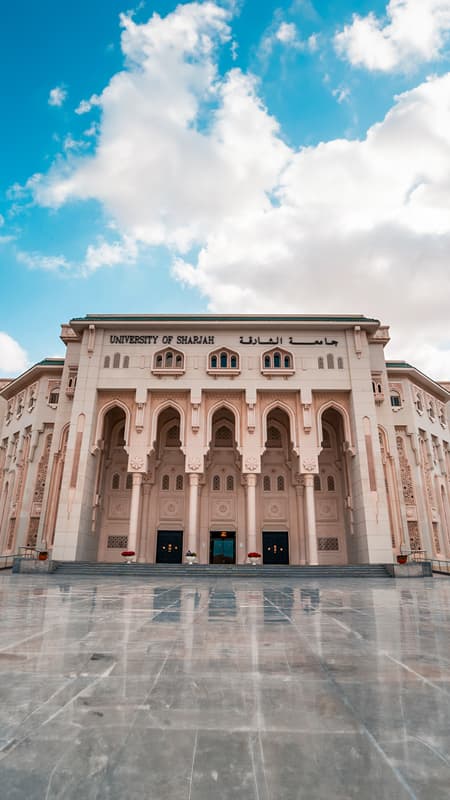Global
The University of Sharjah Participates in the International Particle Physics Training Program in Collaboration with CERN
With the support and sponsorship of the UAE Ministry of Education, the UoS Office of the Vice Chancellor for Research and Graduate Studies and the Research Institute of Sciences and Engineering’s High Energy Particle Physics Research Group organized the International Elementary Particle Physics Program. The initiative, held in coordination with the Ministry of Education and in collaboration with the European Organization for Nuclear Research (CERN) in Switzerland, aimed to provide high school students from both public and private schools across the UAE with a unique international learning experience. This initiative reinforces the UAE’s commitment to advancing scientific research and encourages students to engage in global scientific endeavors.
More than 200 students took part in analyzing real data from measurements conducted by the Large Hadron Collider (LHC) in Geneva, under the supervision of faculty from the UoS Department of Physics. This hands-on experience allowed students to engage in real-time data analysis at the same time as their peers working in other universities and discuss their findings with CERN experts in Switzerland. The program offered a rare opportunity for students to explore the field of particle physics, gaining insights into fundamental particles such as quarks and leptons. It also introduced them to practical methodologies for analyzing real-world data and understanding the interactions governing matter and forces. Through this experience, students developed critical thinking and teamwork skills, and engage in direct communication with leading researchers from around the world.
In her opening remarks, Dr. Noura Alkarbi, Head of the Research Outreach Department at the University of Sharjah, emphasized that the program reflects the University’s commitment to fostering strong ties with the community. She highlighted the University’s role in providing students with valuable learning opportunities in advanced sciences, reinforcing the UAE’s position as a leader in scientific research. She further noted that the collaboration between the University of Sharjah and the Ministry of Education is part of a broader strategy to enhance students' competencies in physics and contribute to building a knowledge-driven society under the guidance of the nation’s leadership.
Dr. Moza Al Khatri, Head of the Gifted and Talented Student Care Team at the Ministry of Education, underscored the program’s significance in supporting gifted and talented students and advancing the field of physics. She described it as a strategic step toward nurturing scientific and innovative skills among high-achieving students. She also emphasized that the Ministry of Education is committed to providing stimulating educational experiences that foster scientific and analytical thinking, which plays a crucial role in achieving technological and industrial advancement. Additionally, she highlighted the ministry’s efforts to organize training programs in collaboration with universities and academic institutions, as well as its dedication to engaging students in international competitions. These initiatives aim to enhance students’ capabilities, strengthen their scientific skills, and encourage greater participation in research and practical applications in various physics-related fields, ultimately contributing to the UAE’s progress in this critical discipline.
The program featured a series of theoretical lectures that provided a comprehensive overview of physics and its diverse branches, emphasizing its importance across different scientific disciplines. Amine Ahriche, professor of high energy physics at the UoS Department of Applied Physics and Astronomy, delivered a lecture titled Particle Physics at the University of Sharjah. He distinguished between particle, nuclear, and atomic physics, explained pathways for specializing in particle physics, and elaborated on why the University of Sharjah is an ideal place to study this field. Dr. Kamal Saoucha, a postdoctoral researcher at the Research Institute of Sciences and Technology (RISE) at the University of Sharjah and a member of the ATLAS experiment at CERN—one of the world’s leading physics experiments—delivered a lecture titled An Introduction to Particle Physics. Meanwhile, Pavel Starovoitov, associate professor at the Department of Applied Physics and Astronomy and coordinator of the ATLAS team in Sharjah, gave a presentation on the ATLAS detector and its operation.
During the training workshop, participants had the opportunity to analyze real experimental data from CERN’s laboratory. After receiving instructions on using the HYPATIA software, students examined data from the ATLAS experiment and extracted results simultaneously with participants from other universities involved in the training. Their findings were then discussed with scientists and experts from CERN via video conferencing. The event also included interactive discussions where experts posed questions to assess students' understanding of key concepts. Additionally, students engaged in Q&A sessions, demonstrating their keen interest in this field of research.




